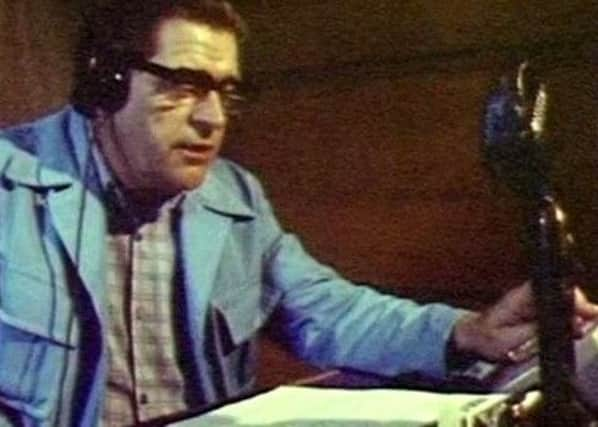Obituary: Arthur Binnie, journalist


Arthur Binnie was senior BBC producer who as a young journalist in Arbroath in April 1951 scooped the world in breaking the news that the Stone of Destiny had been found.
After the audacious removal of the Stone from Westminster Abbey on Christmas Day 1950, it vanished, only to reappear one April morning 100 days later, wrapped in a Saltire, and lying on the site of the High Altar of Arbroath Abbey.
Advertisement
Hide AdAdvertisement
Hide AdTwo prominent local councillors in Arbroath, each with strong Nationalist sympathies, had been briefed by the conspirators to tell the press – in those days the rival papers of the Arbroath Herald and the Arbroath Guide.
Mr Binnie worked for the Herald, and chanced on Frank Thornton, one of the councillors in the street. Immediately Arthur sprinted back to the Herald office, picked up a heavy plate camera, and raced on his bike for the Abbey.
He filed the story and pictures for his newspaper first, then began a marathon phone session tipping off the national press.
The other councillor, “Dad” Gardiner, had been primed to go first to the police to let them know that the Stone lay in the Abbey – after which, he was to let staff at the Guide know. But given Cllr Gardiner’s Nationalist leanings, the constabulary detained him, thus depriving the Guide of his message… and the story.
The taking of the Stone of Destiny from underneath of Coronation Chair in Westminster Abbey by Ian Hamilton, Gavin Vernon, Alan Stuart and Kay Matheson, all students from Glasgow University, captured Scotland’s imagination, and the world’s too – and inspired admiration and amusement throughout Scotland. Even those who publicly had to deprecate the incident laughed privately at the audacity of it all.
The feat of the four brought light and laughter to post-war Scotland and led police on both sides of the Border a merry dance. Winston Churchill, the Prime Minister, ordered every effort to find the Stone, while King George VI sent a personal reprimand to the Dean of Westminster. Folk singer John McEvoy composed The Wee Magic Stane in honour of the event.
But there was no laughter from the Establishment. Sacrilege at Westminster! roared the Daily Telegraph. A coarse and vulgar crime thundered The Times. Is nothing sacred to these criminals? opined the Daily Mail.
The Stone created the greatest manhunt ever seen in the UK. Every police force in Britain was involved. Ports were closed, cars were stopped and English policemen were sent to Scotland. Legally, English police have no jurisdiction here, but they were sent because of doubts in London about the loyalty of Scotland’s police forces. One Glasgow policeman, quoted at the time in the Scottish Daily Express, summed up the covert admiration for the “criminals” when he said: “Aye we’re looking for them, but no so damned hard that we’ll catch them”.
Advertisement
Hide AdAdvertisement
Hide AdThanks to Arthur’s assiduous work, the recovery of the Stone was not simply a scoop for his newspaper the Herald – Arthur made enough out of lineage (selling on the story to national newspapers) that he was able to marry his fiancée Bette and set up home.
Arthur Binnie was born in Arbroath into a poor but loving family occupying a tenement flat with an outside toilet. He learned Pitman’s shorthand at school, and saw service at the end of the Second World War. After the Arbroath Herald, he moved to Aberdeen, joining the Evening Express as a general reporter, moving on to become a special features writer, nightly columnist of Bon-Accord Gossip, and latterly chief sub-editor. His decade with the paper saw him cover the outbreak of typhoid in 1964, when Aberdeen became a world focus for all the wrong reasons.
When BBC Aberdeen was set up, Mr Binnie was hired as news editor. For someone with such a news sense, he proved the right man in the right place at the right time. Under his direction, BBC Aberdeen gained some of the earliest insights in discovery and landfall of North Sea oil. In its corporate wisdom, the BBC board not only gave BBC Aberdeen one-fifth of the UK landmass to cover (Dundee to Stornoway and Shetland), but also awarded the station the smallest film handling capacity anywhere in Britain, with a staff of just three including Arthur. But his nose for news landed him premier coverage when in January 1978, the Inverness-Wick train with 70 passengers aboard became lost in a snowstorm somewhere north of Forsinard. He and duty reporter Bill Hamilton gambled on the BBC budget stretching to the hire of a £1000-per-hour helicopter. Bill located the snowbound train, arranged for the helicopter to take injured passengers north to Wick, got the story on film, and then was picked up again by the helicopter back to Aberdeen.
Arthur’s direction of the whole episode ensured that BBC broke the story of the “lost” train with film, sound and pictures that no one else gained.
It proved only a matter of time before Mr Binnie would be headhunted, and in 1980, he moved to BBC Pebble Mill at One in Birmingham.
In his long career, his many protégés included Ron Neill, once a young Scottish Daily Express reporter in Aberdeen who went on to become head of programmes for BBC in London.
Mr Binnie is survived by his wife Bette, daughter Susan and two grandsons. He was predeceased by another daughter Irene some years ago.
GORDON CASELY